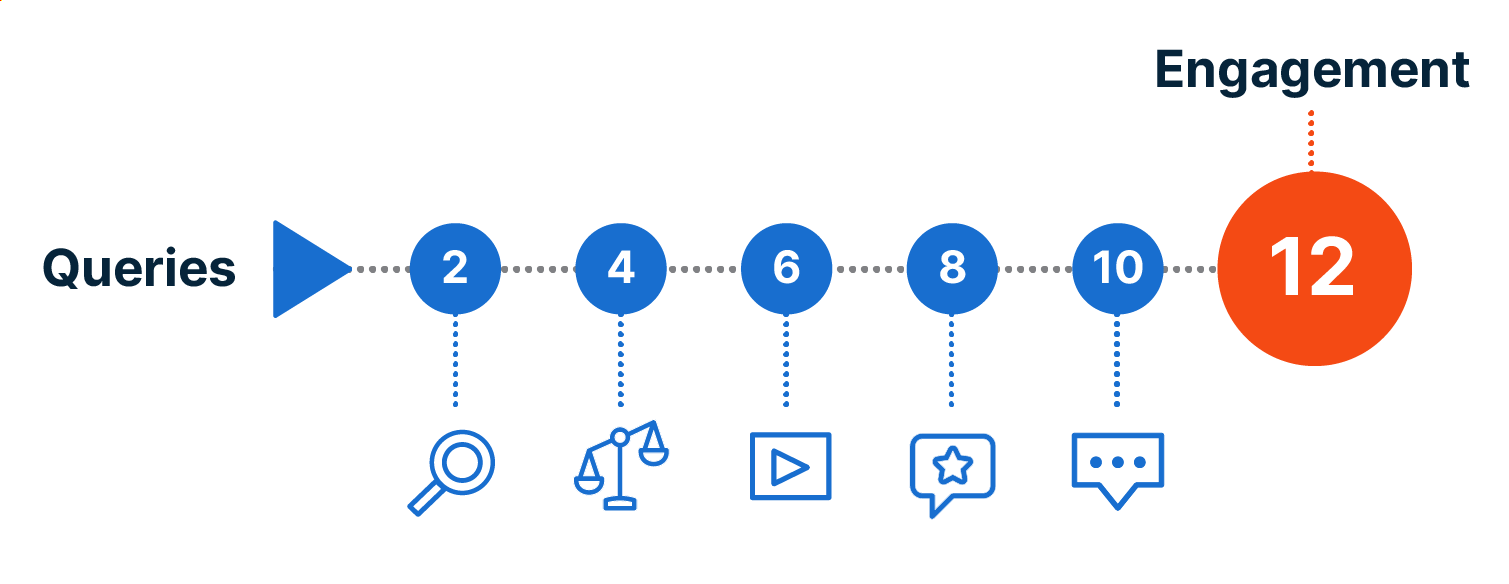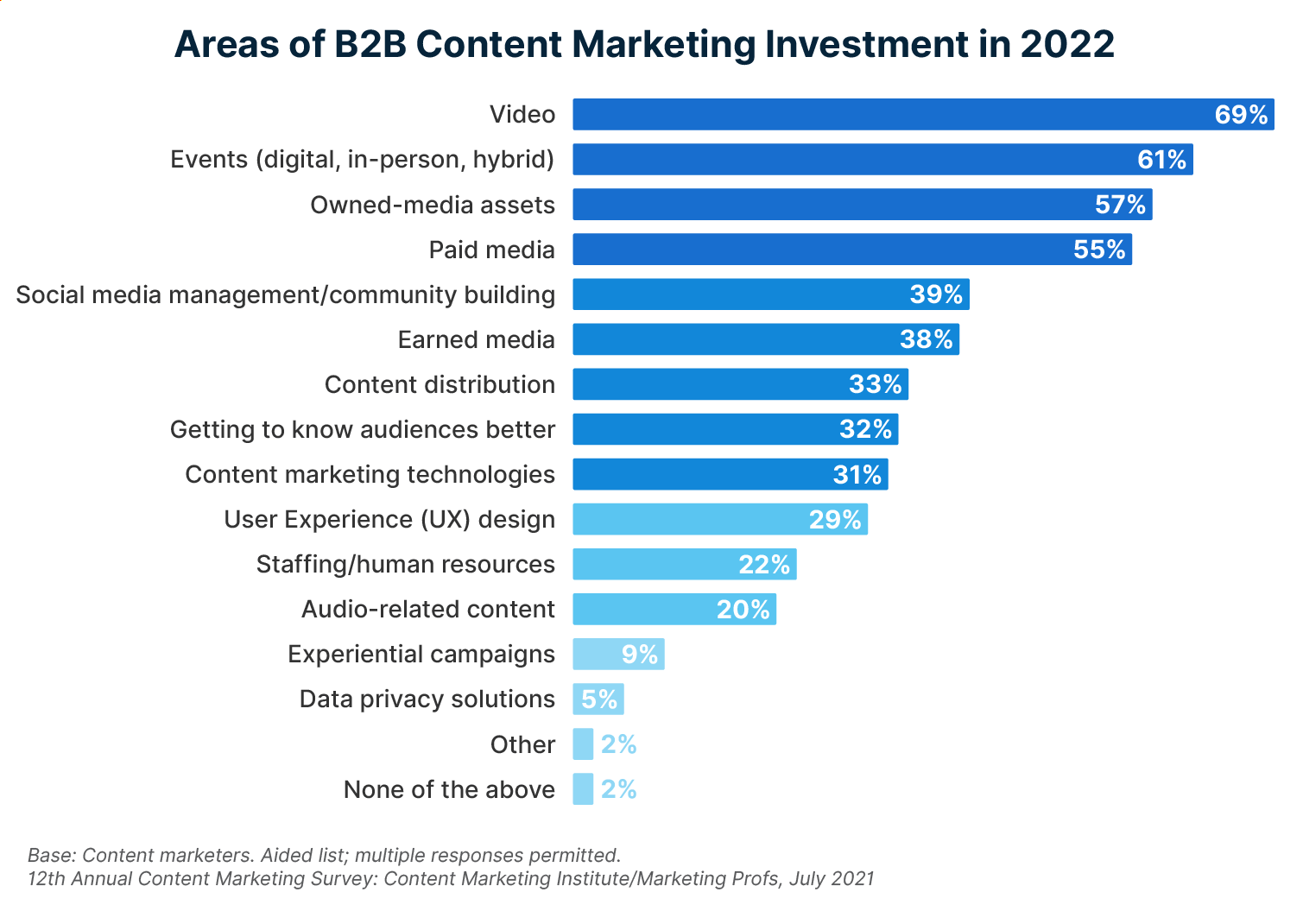B2B content marketing for tech companies is an opportunity to educate your customers about complex topics while generating demand for products many businesses don’t know they need. Because most tech companies already have a strong digital presence, you must take your content marketing strategy to the next level to stand out from your competition.
Use this guide to learn about B2B content marketing for tech marketers and how to use it to benefit your business.
Key Takeaways:
- B2B content marketing for the tech industry requires targeted audience personas
- Content marketing leads customers through the sales journey from discovery to purchasing
- B2B content marketing is informational and logical rather than emotional and entertaining
- Content syndication broadens your content’s reach
🤫 PS: Looking for pricing on custom content for Tech? Get a price list here
B2B Content Marketing Definition
Content marketing is an inbound marketing technique using digital content to attract and convert leads. While your outbound marketing strategies go to where your audience is to deliver your message, inbound content marketing attracts your audience to your website through search engine optimization and content syndication, where you introduce your products and services.
B2B content marketing differs from B2C content marketing because you reach a niche audience of business professionals rather than a broad customer market. These industry experts are interested in data and research in addition to emotional marketing techniques that average customers respond to.
Some examples of B2B content marketing include:
- Blog posts
- E-books
- Infographics
- Whitepapers
- Videos
- Case studies
- Technical briefs
- Podcasts
- Images
- Webinars
- Social media content
Why Should Tech Businesses Use B2B Content Marketing?
Content marketing has seen great success in B2B businesses, and over half of business buyers say they are more likely to purchase from a company after reading their digital content. Your online content leads potential clients through the buying journey from discovery and research to the decision phase. According to a Content Marketing Institute survey:
- 73% of content marketers nurtured leads
- 64% of content marketers generate revenue
- 60% build their subscribed audience
Online content also reaches your customers before they interact with your brand. For example, Google shows that most B2B buyers interact with 12 pieces of online content before going to your website.

Here are several other benefits of content marketing for B2B businesses and why it works in the tech industry.
Creates a Demand
Blog posts, e-books, and videos are platforms for creating a demand for your products by educating your audience about concerns they might not be aware they have.
Generates Leads
Once you make your audience aware of challenges in their industry, you can position your products and services as a solution through case studies and whitepapers that provide data to back your claims.
This is also a point where your content can generate leads. For example, you encourage readers and viewers to sign up for a demonstration of your products, download a digital asset, or subscribe to your newsletter to view more information. Content marketing is more effective for lead generation than traditional strategies because it costs 62% less while attracting three times as many leads.
Nurtures Your Leads
While your IT marketing and sales team can take over with nurturing and converting those leads, you can still use content marketing to support B2B customers in the research and decision phases. For instance, your content can continue to offer more information about their options.
Supports Existing Customers
Your content supports loyal customers even after initially converting them. Existing customers are valuable as 30% of B2B revenue comes from returning customers. Your chance of selling to a loyal customer is over 60% compared to the 5% to 20% chance of selling to a new customer.
How To Create a Successful B2B Content Marketing Strategy
These five steps will help you build a B2B content marketing strategy that attracts quality leads and achieves your business goals.
1. Segment Your Audience
Build several ideal business profiles according to your different services, business primary decision makers, and industries. Creating specific profiles allows you to target a niche audience and address your clients personally. You can also build a targeted accounts list according to those personas for an account-based marketing strategy.
2. Choose a Content Marketing Goal
Each piece of content you create will have a different goal. Some examples of content marketing goals include:
- Generate quality leads
- Create demand
- Build awareness
- Convert leads
- Encourage brand loyalty
Within those broad goals, your content will have a specific purpose. For instance, content that generates quality leads might have the specific goal of encouraging readers to download your digital asset. Establishing a goal also gives you a benchmark for measuring your content marketing success.
3. Create Relevant Content
B2B content must be informative and educational, not wasting the readers’ time with emotional manipulation or fluff content. However, while you want to be informative, don’t forget that your audience is human, so don’t overwhelm them with industry jargon or complex digital assets that aren’t easy to navigate on different devices.
Instead, use a data-driven content marketing strategy by performing research before diving into content creation. Then you’ll create materials they want to read and interact with. Keyword research is vital for search engine optimization and creating relevant content because it shows you questions and search queries from leaders in your industry.
Consider the following popular B2B content marketing forms for presenting the topics you choose from your research.

4. Know the Most Effective Channels
Once you have your content, you must distribute it where your primary audience will read it. Your audience personas and past lead generation channels will guide your decisions. Online research will also tell you where your target audience interacts with digital content.
For example, 87% of B2B marketers use email in their lead generation efforts, and 31% say it has the most significant impact on their revenue.
5. Use Content Syndication
Content syndication is publishing your content on other websites. While some content syndication goals are to build brand awareness, you can see more value and increased revenue by using content syndication for lead generation.
Content syndication for lead generation is a strategy of posting digital assets on websites and apps that already reach your target audience. Your audience will exchange their personal information for your content, which generates a list of qualified leads.
Generate More Leads with Quality Content
ActualTech Media helps you generate more leads by creating unique and quality content and distributing that content through targeted content syndication strategies. Build a diverse content strategy using video, infographics, e-books, case studies, blogs, and more with the help of our team of content experts.
Contact us to learn more about our B2B tech marketing content options.